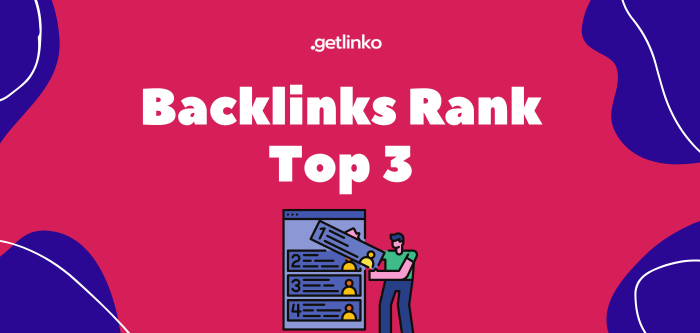A lot of website owners and SEO experts aspire to rank in the top three on Google. In this quest, backlinks are essential because they serve as endorsements from other websites. Still, it’s unclear how many backlinks are necessary to be in Google’s top 3. The quality of the backlinks themselves, domain authority, content quality, and competition analysis are some of the factors that go into the complex answer. To give readers a thorough grasp of the backlink criteria for top rankings, this article explores these elements in depth.
Understanding Backlinks and Their Importance
Links originating from one website to another are known as inbound or backlinks. Backlinks are one way that Google determines the authority and relevancy of information. For search engines, every backlink is essentially a vote of confidence indicating to them that the information is reliable and worthwhile.

The Role of Backlinks in SEO
One of Google’s main ranking variables is backlinks. They aid search engines in determining whether websites are reliable and knowledgeable about a particular topic. A website’s chances of ranking well increase with the number of high-quality backlinks it has. This is due to the fact that backlinks function as testimonials from other websites, implying that your material is trustworthy and valuable.
But not every backlink is made equal. Backlink number is not as important as backlink quality. A backlink from a highly reputable website in your industry is far more valuable than several backlinks from unrelated or low-quality websites.
Factors Influencing Backlink Requirements
- Keyword Competition: In general, highly competitive phrases will need more backlinks in order to rank well. Stronger backlink building will be required for keywords with significant search volume and established rivals.
- Content Quality: Backlinks are drawn to useful, interesting, and high-quality content organically. High-quality content that provides substantial value and fully answers user queries can lower the total amount of backlinks required to rank well.
- Domain Authority:With fewer backlinks, websites with a higher domain authority (DA) can frequently rank for competitive keywords. Moz created the DA statistic, which forecasts a website’s performance on search engine result pages (SERPs).
- Backlink Quality:The backlinks’ quality is quite important. Links from high-ranking, relevant websites carry much more weight than links from irrelevant or poor-quality websites. A small number of excellent backlinks can have a greater impact than a large number of poor ones.
Estimating Backlink Needs
Although the precise quantity of backlinks needed to rank in Google’s top 3 is unknown, a calculated technique can assist you determine how many you’ll need. Conduct a Competitive Analysis First: Utilize SEO tools like as Ahrefs, SEMrush, or Moz to examine the pages that rank highest for your desired keyword. This study gives you a reference point for your backlink objectives.
Analyze the Backlink Gap by contrasting your present backlink profile with that of your rivals. Aim to develop a similar amount of high-quality backlinks if the top sites have an average of 200.
Content Optimization is crucial. Make sure the content you have is better than what is currently ranking. This includes in-depth discussion of the subject, current data, interesting media (pictures, videos, infographics), and an enhanced user interface.
Use Diverse Link-Building Strategies: To establish a strong and varied backlink profile, use a variety of techniques, including influencer outreach, content marketing, broken link building, and guest blogging.
Practical Backlink Building Steps
Create Link-Worthy Content: Publish in-depth manuals, unique studies, case studies, and infographics that add a lot of value and are likely to get linked to from other websites.
Outreach Campaigns: Reach out to bloggers, influencers, and websites in your niche to let them know about your excellent material. Your chances of obtaining backlinks can be greatly increased by using personalized outreach.
Leverage Social Media: Use social media to spread the word about your work and get organic backlinks. The reach of your material can be increased by interacting with influencers and your audience.
Guest Blogging:Write guest posts for reputable sites in your industry. In return, include a backlink to your site within the content or author bio.
Fix Broken Links:To locate broken links on pertinent websites, use tools. Suggest your material to the site owners as a possible alternative for the broken link.

The Long-Term Approach to Backlink Building
SEO is a continual activity rather than a one-time endeavor. Sustaining a robust backlink profile calls for constant work. Maintain your content current by updating it frequently, and participate in link-building initiatives on a regular basis.
Monitoring and Adjusting: Track your rankings and keep an eye on your backlink profile using SEO tools. Adapt your tactics according to what is and is not working. Examine your opponents’ strategies and adjust if you see them gaining growth.
Focus on Quality Over Quantity:Make sure that a big number of high-quality backlinks are always given preference over low-quality ones. Few high-quality links can have a bigger influence on your rankings than a large number of low-quality ones.
Engage with Your Audience: Developing contacts within your sector may result in prospects for organic backlinks. Interact with your viewers, take part in business gatherings, and cooperate with other content producers.
Conclusion
Since it depends on a lot of variables, including backlink quality, domain authority, content quality, and keyword competition, there is no set amount of backlinks required to rank in Google’s top 3. Prioritizing quality above quantity, producing exceptional content, and utilizing a variety of link-building techniques will all greatly increase your likelihood of ranking highly.
Gaining and sustaining top Google ranks requires regular backlink construction and maintenance, which is a long-term effort in SEO. You may raise your website’s organic traffic and search engine rankings by researching your competitors, refining your content, and carefully constructing high-quality backlinks.
Recall that perseverance, flexibility, and a dedication to offering value to your audience are the keys to SEO success. Your ultimate objective should remain in mind while you develop a strong backlink profile: making a website that people regard authoritative and valuable. This strategy will inevitably result in improved rankings and long-term success in the cutthroat field of search engine optimization.








